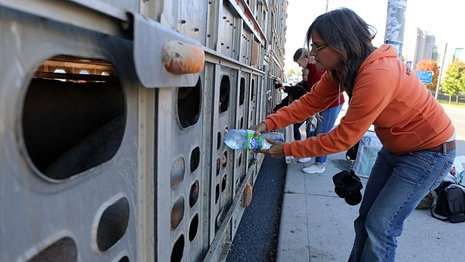Judge dismisses charges against activist
By Jennifer Jackson
Today, a judge in Milton ruled animal activist Anita Kranjc not guilty of mischief in the livestock tampering case.
In June 2015, Halton police arrested Kranjc after she gave water to pigs on a truck, which was located outside a Burlington slaughter house.
Prosecutors representing hog farmer Eric Van Boekel argued that Kranjc tampered with private property. Kranjc’s defense argued she was acting in the public good and did not harm the pigs.
Kranjc’s verdict may encourage other activists to participate in activities that could risk food security, animal welfare and human safety, according to a combined statement from Farm & Food Care Ontario, Ontario Pork, the Ontario Federation of Agriculture (OFA), and the Christian Farmers Federation of Ontario (CFFO), released May 4.

Anita Kranjc gives water to pigs headed to Fearman's Pork in Burlington.
Photo: Elli Garlin
Ontario pork producers follow strict standards regarding animal care, according to Eric Schwindt, board chair for Ontario Pork.
“This (ruling) is frustrating for Ontario pork producers, who adhere to federal regulations and high standards of animal care, and are constantly evolving to further enhance their commitment to healthy animals and communities,” he said in the release. “Our concern in this instance was specific to the safety of food and people.”
Schwindt said the judge had put sufficient thought into the verdict, however.
Although the case itself was unfortunate, “I was impressed how well thought out and well reasoned (the judge’s reasoning) was, and that he supported animal agriculture in every (point),” he said in a phone call. “He was very clear that in this case the producer in question – and the industry in general – follows regulations, … transports pigs humanely, and that food safety is (a priority) to everybody.”
The prosecuting team argued that an unknown substance offered to the pig could threaten not only the specific truckload but also the food system.
The pigs still went to slaughter without issue or mention of a possible contaminant, Judge David Harris said in court, according to CBC.
However, any type of interference while shipping livestock can be risky for those involved, says Pat Jilsen, director of the OFA.
“The livestock industry abides by the Canadian Food Inspection Agency’s Health of Animals transport regulations. This ensures the well-being of all livestock during movement and transport,” he said in the release. “Interfering with animals during transport is simply unsafe for the animals and the people involved.”
Clarence Nywening, president of the CFFO, noted her discontent with the verdict. “This (ruling) is a huge disappointment to Ontario farmers who are committed to keeping animals healthy and safe throughout their lives,” she said in the release. “Actions like this by activists are putting pigs, families, communities and livelihoods at risk.”
The OFA, CFFO, Ontario Pork and Farm & Food Care Ontario will meet and discuss how to advance with this issue, according to the release.
The groups want to ensure society understands that they are in good hands in terms of how their food is produced, said Schwindt.
“On a high level, we want to make sure everyone is confident in our animal welfare and food safety programs – we want to keep getting that message out (there) that we treat our animals humanely. We are required to transport (our livestock) under regulation and we follow those regulations,” he said in a phone call. “On an individual level, I do feel sorry for truck drivers who have to deal with protestors. We all deserve to work in safe environment and that’s tough (to achieve) when we have people that don’t respect (this).
“We wished the incident didn’t happen – we want to produce pork and our family farms want to continue on with our business. We don’t want to be in court rooms – it’s not our livelihood.”